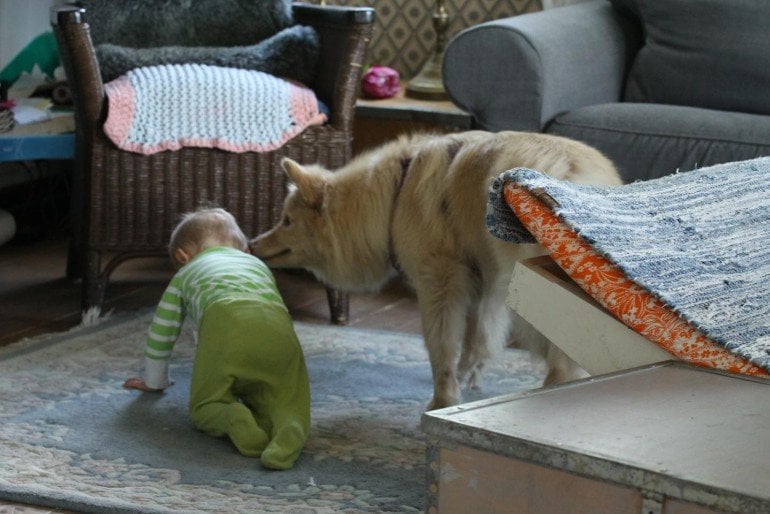Summary: The living environment has a significant impact on the skin microbiota, but not gut bacteria, in both humans and dogs.
Source: University of Helsinki
In urban environments, allergic diseases are more common among dogs and their owners compared to those living in rural areas. Simultaneous allergic traits appear to be associated with the microbes found in the environment, but microbes relevant to health differ between dogs and humans.
In a joint research project known as DogEnvi, researchers from the University of Helsinki, the Finnish Environment Institute and the Finnish Institute for Health and Welfare have previously observed that dogs are more likely to have allergies when their owners suffer from allergic symptoms. In a new study, the researchers investigated whether such simultaneous presence of allergic traits is associated with gut or skin microbes shared by dogs and their owners. A total of 168 dog-owner pairs living in rural and urban environments participated in the study.
“Research shows that dogs and owners living in rural areas have a lower risk of developing an allergic disease compared to urban areas. We assumed that in rural areas both dogs and owners are exposed to health-promoting microbes. We found that the microbial exposure of both was different in rural and urban environments. For instance, the skin microbiota varied more between individuals in rural areas compared to their urban counterparts. A diverse and varying microbial exposure may be precisely what provides the associated health benefit,” says Senior Researcher Jenni Lehtimäki, PhD, from the Finnish Environment Institute.
Dogs and their owners seemed to share microbes on their skin, but not in their gut. The study demonstrated that the living environment had a markedly more significant effect on the skin microbiota than on that of the gut in dogs and humans. Dogs living in urban areas had on their skin more microbes typically found on human skin, which may be caused by the accumulation of microbes typical to humans indoors and in urban areas, a phenomenon that has been previously observed.
In a study conducted earlier, the researchers noticed that both the living environment and living habits affected the canine skin microbiota.
“The same was now observed in humans. For both dogs and humans, the risk of developing allergic diseases was at its lowest when the skin microbiota was shaped by a rural environment and a lifestyle that promotes microbial abundance. Such a lifestyle was associated with a number of different animals in the family, as well as larger family size,” says Professor Hannes Lohi from the University of Helsinki.
While the living environment appeared to alter the species of the skin microbiota as well as the risk of allergic diseases in both dogs and their owners, no single shared microbe in the environment had a link to allergies in both dogs and humans.

“We detected microbes associated with allergies in urban dogs, as well as microbes connected to health in rural dogs and humans, but these microbes were different in dogs and humans. It appears that the microbes in the living environment are important for the health of both dogs and humans, but due to the physiological differences of the species, the microbes that are relevant can vary,” Lehtimäki sums up.
DogEnvi, a multidisciplinary research project launched in 2014, is aimed at investigating the significance of the living environment to canine health. Under the project, a study on the link between canine gut microbiota, nutrition and allergies is being prepared.
Funding: The project has received funding from the Jane and Aatos Erkko Foundation, among others.
About this neuroscience research news
Source: University of Helsinki
Contact: Hannes L – University of Helsinki
Image: The image is credited to Emma Hakanen
Original Research: Open access.
“Simultaneous allergic traits in dogs and their owners are associated with living environment, lifestyle and microbial exposures” by Jenni Lehtimäki, Hanna Sinkko, Anna Hielm-Björkman, Tiina Laatikainen, Lasse Ruokolainen & Hannes Lohi. Scientific Reports
Abstract
Simultaneous allergic traits in dogs and their owners are associated with living environment, lifestyle and microbial exposures
Both humans and pet dogs are more prone to develop allergies in urban than in rural environments, which has been associated with the differing microbial exposures between areas. However, potential similarities in the microbiota, that associate with environmental exposures, in allergic dogs and owners has not been investigated. We evaluated skin and gut microbiota, living environment, and lifestyle in 168 dog-owner pairs. Due to partly different manifestations of allergies between species, we focused on aeroallergen sensitized humans and dogs with owner-reported allergic symptoms. Our results agree with previous studies: dog-owner pairs suffered simultaneously from these allergic traits, higher risk associated with an urban environment, and the skin, but not gut, microbiota was partly shared by dog-owner pairs. We further discovered that urban environment homogenized both dog and human skin microbiota. Notably, certain bacterial taxa, which were associated with living environment and lifestyle, were also related with allergic traits, but these taxa differed between dogs and humans. Thus, we conclude that dogs and humans can be predisposed to allergy in response to same risk factors. However, as shared predisposing or protective bacterial taxa were not discovered, other factors than environmental microbial exposures can mediate the effect or furry dog and furless human skin select different taxa.






